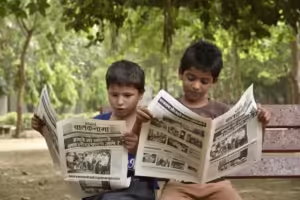A cluster of articles on our website, telling and explaining the meaning and approach of Montessori, makes it clear for everyone to understand the word deeply, its importance in early childhood, and the wonderful educational approach it has.
As we, Wisdomnest always works with the motto “Education is a right of every child” along with implying that Montessori education is also necessary and important. Montessori education should be provided to every child going to smart pre-schools or even Anganwadi’s. The main idea is to facilitate early childhood programs for every child across regions that will shape their way of learning.
We all understand one fact as of now is how important is the right way of education in childhood.
Glancing globally overall, you can notice how any minute difference suffices to set a child apart from its peers. Whether it’s race, language, disability, or gender, it’s crucial to identify these differences and find a solution to bring them together for social motives, learning purposes, and general inclusiveness. So, how would this happen? The solution lies in facilitating early childhood programs.
Research and studies undertaken over the last few years have shown that activities in a child’s early years have an inconsistent impact on the rest of their lives. Let us understand what is Anganwadi and what is the relation between Montessori and Anganwadi.
What is the Anganwadi System?
The Anganwadi system is a model of the government’s welfare program for women and children. It was first introduced by the Government of India in 1975 with the aim to address the health, nutrition, and education needs of children under six years old in rural areas.
The initiative is not just to provide education, but to provide a better quality of education for the children. Thus, started implementing Montessori education in Anganwadis with the aim of making it more effective and inclusive.
Montessori education and Anganwadis
In 1982, the Government of India introduced Montessori education in Anganwadis and it has been improving inclusion ever since. In 2015, the Government of India introduced Montessori education in private schools. There are now 2,200 Montessori schools in India. In 2022, the Government of India is planning to provide all children in Anganwadis with a Montessori education. The idea is to bring inclusivity and equity to the classroom.
Montessori education is based on the principle that every child has a different pace of learning and they should be given time to learn at their own pace. This is what makes it inclusive, as it allows children with special needs to learn alongside other children. In the last few decades, there has been a lot of talk about inclusion and the need to make classrooms inclusive. But what does this really mean?
The meaning of inclusion is not just that children with disabilities should be given access to education, but it also means that children from different economic backgrounds should have equal opportunities for education.
A recent study in India has shown how Montessori education in Anganwadis has given birth to inclusion in the classroom. It found that “to the best of our knowledge, this is the first rigorous quantitative evidence on inclusion in school classrooms and parents were highly satisfied with how Montessori education was helping children to become more accepted by their peers, teachers, and the wider community. The survey with the parents found that the majority of respondents felt that the Montessori school had helped their children develop social skills, including problem-solving and communication”. It mentioned a statement by many parents that “This has been very effective in our environment, as it has allowed students to take risks and try new things that they might not have done otherwise”
This is because Montessori education is based on the idea that every child can learn at a pace that is right for them, and when children have the opportunity to learn at their own pace, they are rewarded with more knowledge, a more creative mind, and a better understanding of the world. Montessori education is based on the idea that every child can learn at a pace that is right for them. No matter what part of the world you live in, it is an indisputable truth that every child learns best when they are allowed to choose what they want to do. Children are able to learn what they want because they can take charge of their own learning process. What we need to understand is that children and adults learn in different ways, so we must adapt accordingly.
The following are four techniques for successful learning:
- Learning by doing: This technique takes advantage of the fact that humans have a natural capacity to learn by doing.
- Read-write-do: This technique is different from the learning by doing technique as it requires learners to read a text before engaging in a practice activity.
- Modeling: This technique involves observing what expert teachers or other students are doing, and then trying to imitate them.
- Learning with reinforcement: This technique entails giving learners immediate feedback.
This is applicable to many aspects of life and can be applied to the classroom by enabling them with more choices, such as activities or events to get a better understanding of their learning style.
The government’s Montessori-based initiative in Anganwadi centers has been perceived with the aid of professionals as an exquisite way to encourage parents to send their children to Anganwadi facilities of presidency colleges. This initiative boosts the literacy charge and child education improvement of the nation with reference to talking, writing, getting to know, and communique talents.
What are the challenges that the Indian Government is facing while introducing Montessori education in India?
The challenges while implementing Montessori education in Anganwadis are:
Lack of availability of Montessori resources:
The Indian government has been trying to promote this system of education for the past few years, but the current status of Montessori schools in India is still not very good. There are only about 2700 such schools in India and that number is less than one percent of the total number of primary schools. There is a very limited number of Montessori schools in India, and as such, parents are not able to choose from a wide range of options in terms of where to send their kids. Because there are only so few, you can expect that these schools will all be quite expensive as well.
Lack of Montessori-qualified teachers:
The second major problem is the availability of Montessori-certified teachers. The government of India has been working with the Montessori Association of India to increase the number of qualified Montessori teachers and also to ensure that more children have access to these schools.
In addition, a lot of private schools are now opening up their own Montessori programs. This is because they want to offer parents more choices for their children’s education and because they want to compete with other private schools for students. Still, the reach of schools is very far to achieve.
In 2022, the Ministry of Women and Child Development announced that every Anganwadi in India will be equipped with Montessori education. This is a commendable step taken by the ministry to make education more inclusive for children. It is necessary because education is one of the most important tools for development, said the minister.
Expensive Montessori materials:
The third and last problem is the Montessori school fees and the cost of Montessori materials area big issue for many Montessori schools in India. Since the Montessori schools and suppliers are very less the cost of Montessori schools and materials is very high in India. The cost of a Montessori education kit can go up to $150, which is too expensive for most parents. Thus, making it more difficult for Indian parents to adapt.
Thinking about the on-floor reality, those efforts aren’t sufficient. To similarly put in force and amplify the reach of the Montessori idea in Anganwadis, there is a lot that desires to be achieved by the government – from making an investment in education to maintaining experienced adolescent care personnel. In fact, the Kingdom Council for Educational Studies and Schooling (SCERT) has already begun conducting guides for facilitators to ease the undertaking of taking Montessori-inspired education. Until that is finished, children will remain disadvantaged in early childhood schooling.
What solution does Wisdomnest provide?
Wisdomnest helps to bridge the gap between problems faced by the current education system and the Montessori reach in India by providing:
- Free Montessori-based video lessons for children to learn from are curated by certified Montessori teachers from all over the world. This will help parents and teachers improve the current level of their child’s education without spending a dime. We hope to provide a fun, interactive, and immersive learning experience for children, parents, and teachers. This will also help to increase the reach of education to the remote areas where schools cannot reach.
- An alternative to expensive Montessori materials, i.e. Montessori-inspired worksheets and kits at an affordable price that every child can use. This will help to bridge the gap between the cost of Montessori materials and the ability to purchase them. The Montessori Effect provides kids with a hands-on, natural way to explore and learn about the world around them.
- Awareness about Montessori education with the help of blogs. This is an initiative to provide answers to the questions that come to parents’ minds when choosing which education to follow and what’s best for their child.


